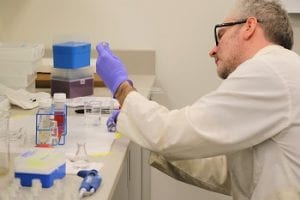Note to media: Interview opportunities available with Dr. Paula Brown. Please contact Amy Chen, 778-384-7245. High-resolution photos related to this story are available for download.
Kombucha: an alcoholic or non-alcoholic beverage?
The BCIT Natural Health and Food Products Research Group (NRG) is collaborating with the BC Centre for Disease Control (BCCDC) to evaluate ethanol levels in kombucha beverages.
Kombucha is a fermented beverage made from sweetening black or green tea and then adding a symbiotic culture of bacteria and yeast, known as a SCOBY. This beverage is described as acidic in taste and can vary in flavour depending on if a flavouring is added in the secondary fermentation process. Kombucha is typically sold as a non-alcoholic beverage, meaning alcohol content should be below 1.1 % Alcohol By Volume (ABV) in Canada.
BCIT developed a headspace gas chromatography mass spectrometry method to measure the ethanol levels in kombucha production and storage. BCIT is now utilizing this method to support a study launched by the BCCDC to assess the potential risk of ethanol in kombucha products in the marketplace.
Watch Dr. Paula Brown, Director of BCIT NRG and Canada Research Chair, explain why BCIT is collaborating with the BC Centre for Disease Control to evaluate ethanol levels in kombucha beverages.
Ensuring an accurate and valid method of testing

Between July and September 2019, BCCDC food safety specialists and environmental health officers from participating BC health authorities collected more than 700 kombucha beverages from locations that included retail grocery stores, restaurants, farmers’ markets, recreation centres, and manufactures.
Collected samples were then submitted to the BCIT Centre for Applied Research and Innovation Phytoanalytics Lab for ethanol testing.
“Our research team is working closely with the BCCDC to accurately determine ethanol levels in the kombucha samples,” explained Dr. Paula Brown, Director, BCIT Natural Health and Food Products Research Group (NRG), Canada Research Chair.
“Through this study and our research at BCIT,” Dr. Brown continued, “It is our goal to establish a set of best practices for production, such as proper storage, to ensure this industry thrives and consumers have access to kombucha products that are healthy and safe.”
SEE MORE: BCIT researchers have received Official Method of Analysis status for cannabinoids in cannabis
What’s next and when will full report be available to public?

According to Adroit Market Research, global sales of the fermented tea beverage reached nearly $1 billion US in 2018. As popularity increases with this product, it becomes even more important to quality control and use the validated method that the BCIT NRG team has developed to accurately determine alcohol concentration in kombucha.
The report findings from this study with BCCDC is now available online. BCCDC and BCIT researchers found that 69% of products sampled tested below 1% alcohol-by-volume (ABV). About one quarter of products had alcohol levels between 1 and 2% and the remaining samples (about 6%) were higher than 2% ABV, with levels found up to 3.6% ABV.
Have you subscribed? Sign-up to receive the latest news on BCIT.
About BCIT Natural Health and Food Products Research Group
The BCIT Natural Health and Food Products Research Group (NRG) addresses issues of product quality, process improvement and human health using basic and applied science along with state of the art technology. The goal is to ensure that all Canadians can achieve the potential health and economic benefits offered by medicinal plants, natural health products and the food industry.
